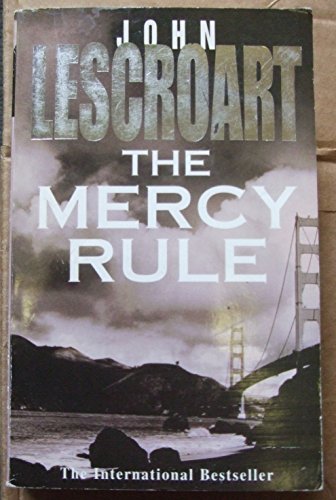
À propos de l?auteur
John Lescroart is the author of over twenty-five novels (and numerous New York Times bestsellers), including The 13th Juror, Damage, The Hunter, and The Ophelia Cut. His books have sold more than 10 million copies and have been translated into twenty languages in seventy-five countries. He lives in Northern California.
Les informations fournies dans la section « A propos du livre » peuvent faire référence à une autre édition de ce titre.
Autres éditions populaires du même titre
Résultats de recherche pour The Mercy Rule
Mercy Rule
Vendeur : ThriftBooks-Phoenix, Phoenix, AZ, Etats-Unis
Paperback. Etat : Good. No Jacket. Pages can have notes/highlighting. Spine may show signs of wear. ~ ThriftBooks: Read More, Spend Less. N° de réf. du vendeur G0755320050I3N00
Acheter D'occasion
Expédition nationale : Etats-Unis
Quantité disponible : 1 disponible(s)
Mercy Rule
Vendeur : ThriftBooks-Atlanta, AUSTELL, GA, Etats-Unis
Paperback. Etat : Good. No Jacket. Pages can have notes/highlighting. Spine may show signs of wear. ~ ThriftBooks: Read More, Spend Less. N° de réf. du vendeur G0755320050I3N00
Acheter D'occasion
Expédition nationale : Etats-Unis
Quantité disponible : 1 disponible(s)
Mercy Rule
Vendeur : ThriftBooks-Dallas, Dallas, TX, Etats-Unis
Paperback. Etat : Very Good. No Jacket. May have limited writing in cover pages. Pages are unmarked. ~ ThriftBooks: Read More, Spend Less. N° de réf. du vendeur G0755320050I4N00
Acheter D'occasion
Expédition nationale : Etats-Unis
Quantité disponible : 1 disponible(s)
Mercy Rule
Vendeur : ThriftBooks-Dallas, Dallas, TX, Etats-Unis
Paperback. Etat : Fair. No Jacket. Readable copy. Pages may have considerable notes/highlighting. ~ ThriftBooks: Read More, Spend Less. N° de réf. du vendeur G0755320050I5N00
Acheter D'occasion
Expédition nationale : Etats-Unis
Quantité disponible : 1 disponible(s)
The Mercy Rule
Vendeur : WeBuyBooks, Rossendale, LANCS, Royaume-Uni
Etat : Like New. Most items will be dispatched the same or the next working day. An apparently unread copy in perfect condition. Dust cover is intact with no nicks or tears. Spine has no signs of creasing. Pages are clean and not marred by notes or folds of any kind. N° de réf. du vendeur wbs7962656211
Acheter D'occasion
Expédition depuis Royaume-Uni vers Etats-Unis
Quantité disponible : 1 disponible(s)
The Mercy Rule
Vendeur : WeBuyBooks, Rossendale, LANCS, Royaume-Uni
Etat : Very Good. Most items will be dispatched the same or the next working day. A copy that has been read, but is in excellent condition. Pages are intact and not marred by notes or highlighting. The spine remains undamaged. N° de réf. du vendeur wbs9505971388
Acheter D'occasion
Expédition depuis Royaume-Uni vers Etats-Unis
Quantité disponible : 1 disponible(s)
The Mercy Rule
Vendeur : AwesomeBooks, Wallingford, Royaume-Uni
Paperback. Etat : Very Good. The Mercy Rule This book is in very good condition and will be shipped within 24 hours of ordering. The cover may have some limited signs of wear but the pages are clean, intact and the spine remains undamaged. This book has clearly been well maintained and looked after thus far. Money back guarantee if you are not satisfied. See all our books here, order more than 1 book and get discounted shipping. N° de réf. du vendeur 7719-9780755320059
Acheter D'occasion
Expédition depuis Royaume-Uni vers Etats-Unis
Quantité disponible : 2 disponible(s)
The Mercy Rule
Vendeur : Reuseabook, Gloucester, GLOS, Royaume-Uni
Paperback. Etat : Used; Good. Dispatched, from the UK, within 48 hours of ordering. This book is in good condition but will show signs of previous ownership. Please expect some creasing to the spine and/or minor damage to the cover. Aged book. Tanned pages and age spots, however, this will not interfere with reading. Damaged cover. The cover of is slightly damaged for instance a torn or bent corner. Ex-library book with stamps on the first page, it is also likely to have a small shelf number sticker on the spine. N° de réf. du vendeur CHL10693403
Acheter D'occasion
Expédition depuis Royaume-Uni vers Etats-Unis
Quantité disponible : 1 disponible(s)
The Mercy Rule
Vendeur : WorldofBooks, Goring-By-Sea, WS, Royaume-Uni
Paperback. Etat : Very Good. The book has been read, but is in excellent condition. Pages are intact and not marred by notes or highlighting. The spine remains undamaged. N° de réf. du vendeur GOR002997416
Acheter D'occasion
Expédition depuis Royaume-Uni vers Etats-Unis
Quantité disponible : 2 disponible(s)
The Mercy Rule
Vendeur : Bahamut Media, Reading, Royaume-Uni
Paperback. Etat : Very Good. This book is in very good condition and will be shipped within 24 hours of ordering. The cover may have some limited signs of wear but the pages are clean, intact and the spine remains undamaged. This book has clearly been well maintained and looked after thus far. Money back guarantee if you are not satisfied. See all our books here, order more than 1 book and get discounted shipping. N° de réf. du vendeur 6545-9780755320059
Acheter D'occasion
Expédition depuis Royaume-Uni vers Etats-Unis
Quantité disponible : 2 disponible(s)

